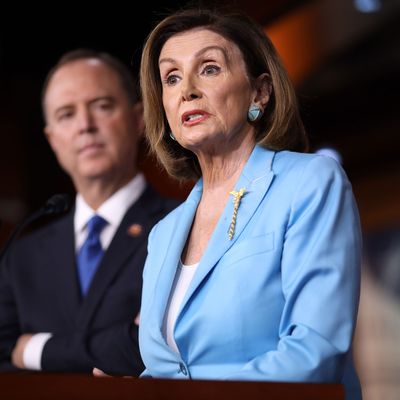
Long before Speaker Nancy Pelosi announced that House Democrats were undertaking formal impeachment proceedings, Judiciary Committee chairman Jerrold Nadler characterized his own investigations of the president and his administration as already constituting an impeachment inquiry, as I noted a couple of months ago:
His position is now clearly that his committee is already “inquiring” into impeachment, and should it decide to adopt articles of impeachment, you could conclude that the “proceedings” began some time ago …
[A]ccording to this interpretation of the situation, there’s no need to “launch” anything, or to put House Democrats on the spot with some vote to begin “proceedings” that are already underway.
House Republicans, knowing that House Democrats were divided on the subject of impeachment, immediately began caterwauling that you can’t move toward a possible impeachment without a formal vote to launch an inquiry. However, while House rules explain how the chamber can initiate impeachment proceedings with a vote, the Constitution does not require any vote prior to formal adoption of articles of impeachment. Furthermore, House rules are totally subject to the will of the House majority at any given moment.
The federal courts are not about to intervene and dispute Nancy Pelosi’s interpretations of these rules, now that she has confirmed Nadler’s judgment that an impeachment inquiry is already underway. And while Republicans accurately note that a vote to begin impeachment proceedings was taken before the Judiciary Committee moved against Nixon and Clinton, legal experts note that has not been the case with other impeachments.
Still, Republicans from sea to shining sea continue to claim a formal vote to begin an inquiry is necessary, and the claim has become part of the White House’s argument that constitutionally sanctioned impeachment proceedings are somehow “unconstitutional,” making its compliance with subpoenas or any other cooperation unnecessary.
And while the original GOP motive for insisting on this entirely optional vote may have been to expose Democratic divisions, that’s rather moot now, with all but eight Democratic House members publicly on record favoring impeachment proceedings, supported by a majority of the public and the vast majority of rank-and-file Democrats. Now the claim is intimately associated with the president’s efforts to delegitimize impeachment, and there is no reason to credit its sincerity, as Molly Claflin of Just Security observes:
There is no indication that the White House would comply with a congressional investigation — with or without a formal vote. Time and time again we have seen the contempt with which this White House views congressional oversight. (As Trump has said: “We’re fighting all the subpoenas,” and “I don’t want people testifying.”) The insistence on a vote is likely no more than another delay tactic to give the White House time to come up with another excuse. The list of grievances in the intemperate 8-page letter by White House Counsel Pat Cipollone on Tuesday is further proof, if anyone needed it, that the demand for a vote is a placeholder for other reasons the administration will provide as a basis for further stonewalling the impeachment process.
As it happens, Pelosi told the editorial board of the Atlanta Journal-Constitution yesterday that a vote to formalize impeachment proceedings could still happen, if and when her caucus deems it necessary and appropriate:
Pelosi also rejected Trump’s demand on Friday for a formal House vote to begin an impeachment inquiry, after the president said his administration wouldn’t cooperate with the probe without a vote.
“If we want to do it, we’ll do it. If we don’t, we don’t. But we’re certainly not going to do it because of the president,” Pelosi said. “It’s wrong for a person to ask a foreign government to interfere in our election, and the president is doing it in full view — and in defiance of what our Founders had in mind.”
Pelosi may choose to pursue a formal vote to define the scope of impeachment proceedings — along with the procedural protections that will be accorded to the president and his allies — once the Ukraine investigation has taken its course, and other committees investigating the administration recommend (or don’t) other possible grounds for impeachment. Any way you slice it, though, impeachment and its procedures are entirely the creature of the House majority: It can adopt articles of impeachment, if it wishes, without a single hearing. There are no formal consequences for the president, after all, until his Senate trial. Lucky for him, that chamber is controlled by his party. All the complaints about “witch hunts” and the alleged persecution of this law-abiding, Greatest President Ever can be aired fully in the Senate if the case for his removal gets that far.






























